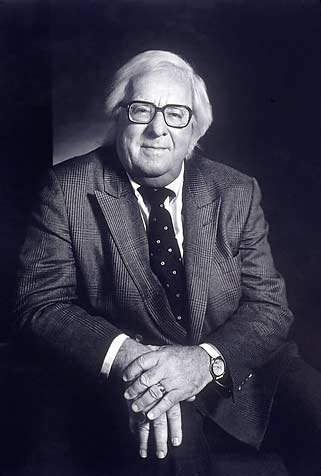 Ray Bradbury, the voice of America's pastIn one Facebook post concerning Bradbury’s death, someone commented that this event heralded the end of an era. Others responded, agreeing or disagreeing, depending on how they interpreted the statement. I didn’t comment one way or the other, but what struck me, however, was the fact that they saw Bradbury as someone BIG, someone defining, not simply a science fiction and fantasy writer. With that sentiment, I agree wholeheartedly. The way I see it, when we lost Ray Bradbury, we lost a part of America.
Ray Bradbury, the voice of America's pastIn one Facebook post concerning Bradbury’s death, someone commented that this event heralded the end of an era. Others responded, agreeing or disagreeing, depending on how they interpreted the statement. I didn’t comment one way or the other, but what struck me, however, was the fact that they saw Bradbury as someone BIG, someone defining, not simply a science fiction and fantasy writer. With that sentiment, I agree wholeheartedly. The way I see it, when we lost Ray Bradbury, we lost a part of America.
In several works, Bradbury wrote about small town America. Several academics and book reviewers have written about this extensively, but really, you don’t have to do much more than look at some of his iconic works. In “Mars is Heaven” (“The Third Expedition” in The Martian Chronicles), earth’s explorers find themselves in a mid-western town rather than the vast red wastes of Mars. In Fahrenheit 451, he eulogizes what he considered “front porch society,” the meeting place where one would go to relax and chat, not just with your own family, but those next door and across the street. Yes, this visionary and master of science fiction never let his eye stray too far off of the past. He definitely kept small town America in the mind of his readers even while they were surrounded by the expanding, ever-quickening pace of the future.
The key element here, of course, is not mere nostalgia. If you crave nostalgia, you can watch Andy Griffith reruns. What we are shown through Bradbury’s works is the essential need of communication. In Fahrenheit 451, people no longer meet to talk to one another; instead, they were immersed in the soap operatic lives presented by the wall screens. People no longer read. Books, of course, are a crucial form of communication. They communicate ideas through the pages, the ideas stir something in us, and ideally, we communicate a response in words or deeds to those around us. In his short story “The Pedestrian,” we see a similar fate. The protagonist walks the streets alone. He is a writer in a world without readers. People stay home glued to their TVs, gray and ghostlike shadows huddling in the darkness. Lifeless. The city has become a graveyard. In “The Veldt,” children immerse themselves into a virtual world. As a result, they lose the ability to communicate and interact with their family. These stories have become eerily real today as teens rather play video games or use some form of social media rather than talk face-to-face with one another. In a world filled with 3D-CGI, Michael Bay explosions, and Halo, the past, sadly, isn’t so important. There’s only the Now, only instant, selfish gratification blasting past at near light speeds.
While the beauty and eloquence of Bradbury’s language echoes the images he created and the ideas he held true, the strength and legacy of Bradbury’s work resides, not in anything profound or visionary, but in all things simple and sincere: a community not afraid to communicate. His writing gave voice to that part of America. Now, that voice is silent.
Rest in peace.